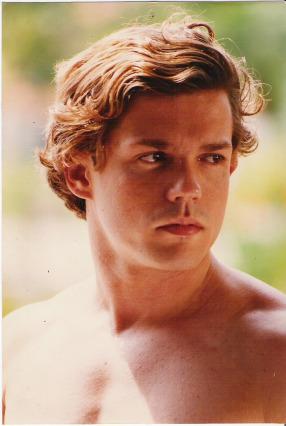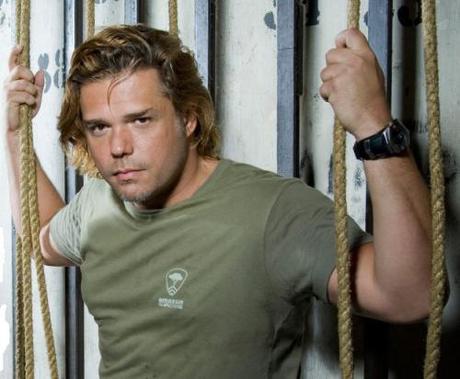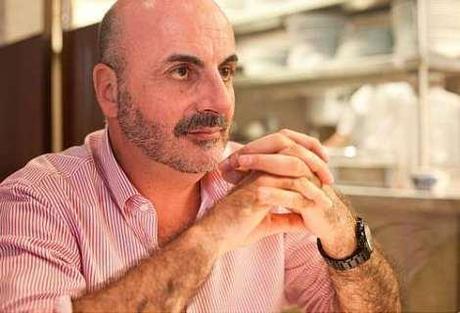Who Are You?

Claudio Botelho & Charles Moeller receiving the Shell Award in 2009
I first met actor, director and writer Charles Möeller and his working partner — singer, actor, translator, adapter and musical director Claudio Botelho — a few years ago, over lunch at a fashionable Brazilian restaurant in the heart of midtown Manhattan. I came away from that encounter praising these two stellar personalities and their splendid musical-theater creations to high heaven.
Prior to meeting them, I had been talking and corresponding with Claudio for a solid year, discussing and trading opinions about numerous aspects of the musical-theater field in the land of Carnival and samba. Soon after inaugurating my blog in July 2012, I began presenting excerpts of the duo’s productions on an ongoing basis. And I continue to write about and comment upon their marvelous shows, as well as their mutual goal of bringing the neglected masterworks of Brazilian musical theater to light.
But the other day, it dawned on me that I have yet to talk about the background of this fabulous Brazilian dream team — which, if the stars and planets gather in proper alignment, will be making its belated Broadway debut later this year in a ground-breaking musical version of the international cult favorite, Black Orpheus.
So let me make amends for this oversight and formally introduce readers to Charles and Claudio, known throughout Brazil as “The Kings of Musical Theater” — or, in their native Portuguese, Os Reis dos Musicais. And that’s no exaggeration! It takes more than kings to make the kinds of tasteful choices and refined decisions these two knowledgeable individuals consistently bring to every one of their musical offerings.
Their enviable record of musical-theater hits is unprecedented in Brazil. The time is ripe, I believe, for North America to make the acquaintance of these superb artists, beginning with Charles Möeller.
Getting to Know Him

Charles Möeller in A Idade da Loba (“Age of the She-Wolf”)
Born in Santos and raised in the beach neighborhood of São Vicente, Charles Möeller Falcão — the youngest of eight siblings — began his theatrical career there in 1986, as a 12-year-old actor, in the play The Novice (“O Noviço”), with fellow santista Neyde Veneziano directing.
Passionate about the theater from an early age, Charles paid frequent visits to the sprawling metropolis of São Paulo to see every show that was within his reach. On one of these many forays, he caught a trilogy of works presented by Antunes Filho: Romeo and Juliet, Nelson 2 Rodrigues and Macunaima. With that, he decided, then and there, what he wanted to do with his life.
“One doesn’t choose to become an actor,” Charles remarked in a later interview. “Either you are or you aren’t. From early childhood, I couldn’t conceive of having any other image in my head that did not involve the theater. I wanted to be a part of that world.”
At 18 he made the move to São Paulo, where for three years he participated in the Center for Theater Research (CPT – Centro de Pesquisa Teatral), founded by noted director and notorious taskmaster, Antunes Filho. This was his baptism of fire into theater life, and to the difficult life of an actor. “Imagine the torture for an eager and anxious youngster such as myself!” Charles confessed to journalist Tania Carvalho.
After acquiring sufficient knowledge of diagrams and blueprints (most of which he had previously attained while studying the subject in São Paulo), Charles became an assistant set designer to architect José Carlos (J.C.) Serroni. “I entered CPT to become an actor and work with Antunes Filho,” observed Charles, “but I came out a stage and costume designer instead for having worked with Serroni.”
From there, he ventured into costume design. In 1989, he worked with Gabriel Vilella on The Council of Love (“O Concílio do Amor”), staged by Boi Voador (“Flying Bull”) Group, a piece about the medieval outbreak of syphilis that, by sheer coincidence, mirrored the worldwide AIDS epidemic that was raging at the time. For his work on the play’s costumes, Charles won the Mambembe, Shell, Apetesp and Paulista Association of Arts Critics (or APCA) Awards. He was also featured in the stage version of John Francis Lane’s Another Time, Another Place (“Outra Vez”), directed by Sergio Viotti.
The success of The Council of Love drew the attention of TV Globo, who summoned him to Rio to audition for a part in one of their early-evening soap operas, Mico Preto (“Black Monkey”). It was his association with cast member and future director, Miguel Falabella, and others that led to a chance encounter with his future working partner Claudio Botelho, who happened to be playing guitar in a play starring the late Italo Rossi. They shared a common interest in, and unfettered passion for, movie and Broadway musicals — a passion neither artist had the faintest idea would grow into a veritable tidal wave in the years to come.

Charles Moeller (bebroadway.blogspot.com)
With confidence in his abilities growing by leaps and bounds, Charles began to divide his time between television and theater. Besides Mico Preto (1990/91 – TV Globo), Charles also appeared in such programs as A História de Ana Raio e Zé Trovão (“The Story of Lightning Ann and Thunder Joe,” 1992/93 – TV Manchete), Idade da Loba (“Age of the She-Wolf,” 1994/95 – TV Plus / Band) and Xica da Silva (1996 – TV Manchete), which I got to see during the first few months of my four-and-a-half-year stay in Brazil, in addition to various episodes of Você Decide (“You Decide”) and A Vida Como Ela É (“Life As It Really Is”) for TV Globo.
As a stage actor, he was featured in Athol Fugard’s Master Harold and the Boys (Antonio Mercado, 1990), Colombo (Marcus Alvisi, director, 1992), and Lake 22 (Jorge Takla, 1995). For the group The Privileged Screw-Ups (“Os Fodidos Privilegiados”), Charles teamed with directors Antonio Abujamra and João Fonseca for the play Exorbitances, a Theatrical Farandole (as actor, costume and set designer, 1996); The Wedding (sets and costumes, 1997), for which he received the Shell Award for best costume design; Compassion for the Self (“Auto da Compadecida,” set and costume design, 1998); and The Libertines (set and costume design, 2000).
Under director Ana Kfouri’s guidance, he created the sets and costumes for a variety of works, beginning with Sensuality (“Volúpia”) in 1997, and Gluttony (“Gula”) in 1999, both plays written by Kfouri.
In 1991, while residing full-time in Rio de Janeiro, Charles assumed responsibility for sets and costumes for The Alienist, a play by Machado de Assis, directed by Almir Telles; for Dorotéia, by Nelson Rodrigues (a relative of his father’s) and directed by Carlos Augusto Strazzer; and especially for Hello Gershwin, a George Gershwin musical homage, with direction by Marco Nanini that co-starred Claudio Botelho and Claudia Netto — a show that barely saw the light of day in Rio (“The main problem was the lack of funds,” Charles noted), but that later moved to the more lucrative environs of the Crowne Plaza in São Paulo.
Charles also prepared the scenery and costumes for the Irving Berlin show Cheek to Cheek (“De Rosto Colado”), helmed by actor Marco Nanini, 1993; Dr. Jekyll and Mr. Hyde, based on the novella by Robert Louis Stevenson, 1994; Young Torless by Robert Musil, 1996; The Fantasticks, the long-running off-Broadway show by Harvey Schmidt and Tom Jones (and newly translated by Claudio Botelho), and The Future Preterite Tense, by Regiana Antonini, 1996; The Beating of Your Heart (“Na Bagunça do Teu Coração”) by João Máximo and Luiz Fernando Vianna, an early tribute to the songs of Chico Buarque, with direction by Bibi Ferreira, 1997; A Poet’s Love, by Tiago Santiago, overseen by André Mauro, 1998; and Leonard Bernstein’s operetta Candide, under the eye of Jorge Takla, 2000.
In 2002, Charles wrote an adaptation of Daniel Defoe’s The Adventures of Moll Flanders which he titled The Diabolical Moll Flanders. For this project, which starred Ary Fontoura, he assumed the dual role of director and set designer. Charles was also invited to design the sets and costumes for several operatic productions that were given at the famed Municipal Theaters of Rio de Janeiro and São Paulo, among them Mascagni’s Cavalleria Rusticana, Puccini’s La Bohème and Madama Butterfly, and Verdi’s La Traviata.

Architect & Set Designer Jorge Takla (blogs.estadao.com.br)
“It was Jorge Takla who contacted me to do them. I got paid well for my work because opera pays well. In the process I became good friends with Jorge. He convinced me to go with him to Europe after the opera was over, that going to London, Paris and New York were an essential part in the life of every artist. It was the first time I had been outside of Brazil, and in Takla’s company, who knows everything about London and Paris, I was shown the ropes.
“Takla was fundamental to my life and career,” Charles went on. “He saw in me a talent for costume and set design, and as an actor, that I never knew I had. And if I’ve visited some unforgettable places and seen things I never imagined existed, it’s to him that I owe it all!”
(To be continued…)
(The above information was compiled from the Möeller-Botelho Website, along with various excerpts from Tania Carvalho’s book, Os Reis dos Musicais, published by Imprensa Oficial, São Paulo, 2009. The English translation is by Josmar Lopes, with grateful acknowledgement to Charles Möeller and Claudio Botelho)
Copyright © 2014 by Josmar F. Lopes

